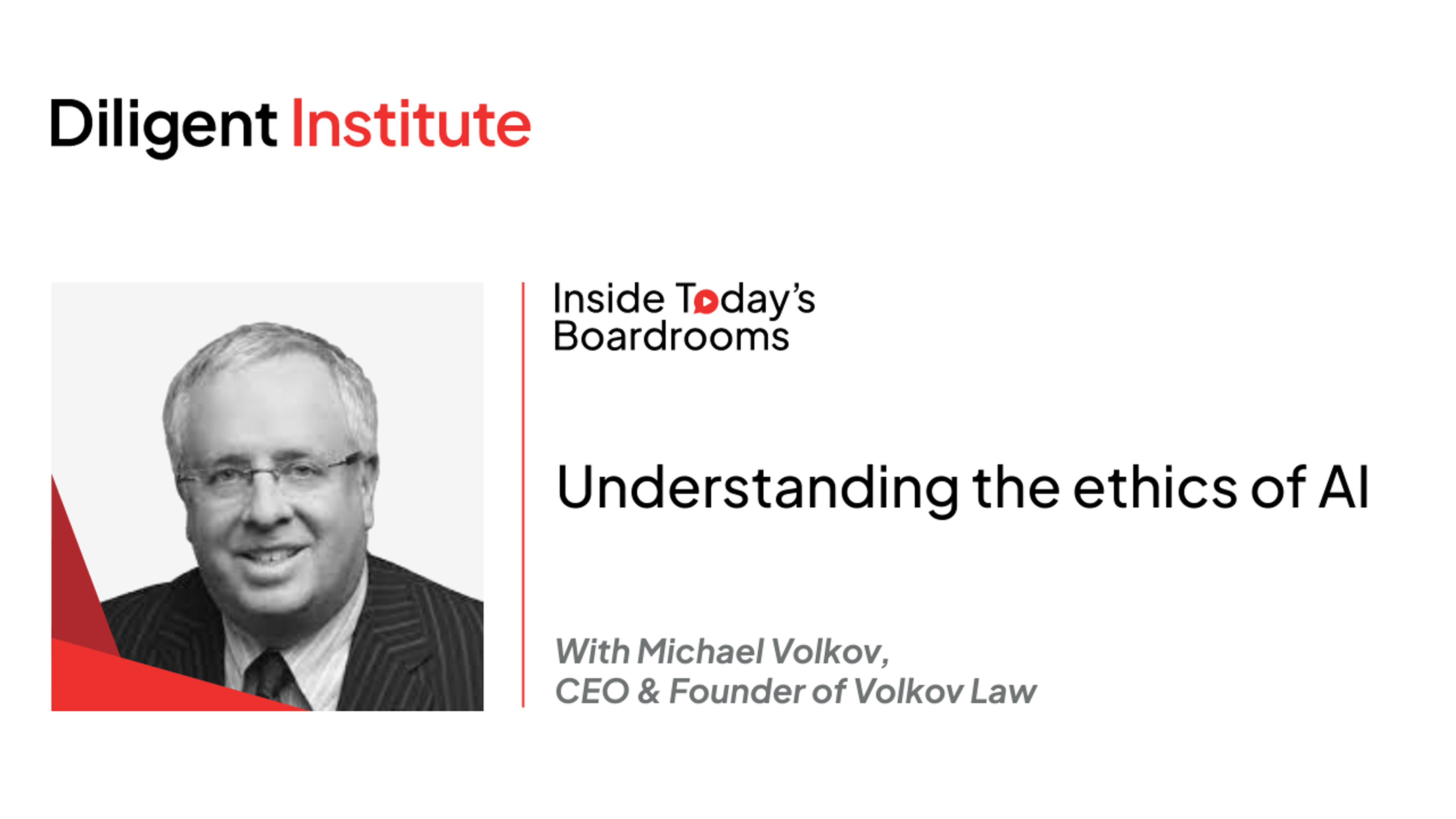The components of a strong AI ethics compliance program

Excerpted from Diligent Institute's AI Ethics & Board Oversight Certification.
Advancements in AI raise profound questions about the interaction between technology and humans. At the heart of the ethical discourse lies the need to strike a balance between the benefits and risks AI poses. Issues such as algorithmic bias, transparency, accountability and the preservation of human values in the face of automation have taken centerstage.
But AI also has the potential to do great good for humanity, such as discovering new effective treatments for intractable diseases, inventing new approaches to complex problems like climate change, or even eliminating the need to hire humans to perform life-threatening jobs. The goal of ethical AI is to foster innovation while ensuring that technology respects human rights, social equity and the well-being of individuals and communities.
The ethics of AI delves into the moral and philosophical dilemmas surrounding the development, deployment and impact of AI technologies.
What are the components of a strong AI ethics & compliance program?
An AI ethics & compliance program is a structured approach that guides how an organization builds and uses AI responsibly while reducing risks like bias or misuse. It sets standards, reviews systems, and ensures practices align with laws and ethical principles.
At its core, a healthy AI ethics and compliance program seeks to navigate the ethical complexities associated with AI by:
• Promoting the fair treatment of individuals.
• The avoidance of bias.
• The preservation of human values.
By establishing clear boundaries, encouraging stakeholder engagement and emphasizing ongoing education, an effective AI ethics and compliance program ensures that AI technologies are harnessed in ways that enhance innovation, uphold ethical integrity, and promote the well-being of both individuals and society as a whole.
Some of the key components that should be part of your AI ethics and compliance program include, but are not limited, to:
- Code of conduct, ethical guidelines and/or ethical AI principles: Outline the expected ethical behavior and principles related to AI development, deployment and usage. These guidelines should serve as the foundation for all AI-related decision-making and help employees navigate complex ethical situations.
- Policies and procedures: Develop specific policies and procedures that address AI-related ethical considerations, such as bias mitigation, transparency, accountability, data privacy and algorithmic fairness.
- Risk assessment and mitigation: Identify potential ethical risks and challenges associated with AI technologies through risk assessments to evaluate the potential impact of AI on individuals (including employees and customers), society at large and the organization as a whole.
- Training and education: Offer training programs to educate employees, stakeholders and developers about AI ethics, compliance requirements and best practices. Training should cover topics such as algorithmic bias, privacy, transparency and the responsible use of AI.
- Transparency and accountability: Implement mechanisms to ensure transparency in AI decision-making processes. Maintain records of AI models, training data and decision outcomes to facilitate accountability and audits.
- Data governance and privacy: Establish robust data governance practices to protect the privacy and security of data used by AI systems. Ensure compliance with data protection regulations and obtain necessary permissions for data usage.
- Continuous monitoring and auditing: Implement ongoing monitoring and auditing processes to assess the ethical impact of AI technologies over time. Regularly review and update AI models and practices to align with evolving ethical standards.
- Reporting and whistleblower mechanisms: Establish mechanisms for employees and stakeholders to report concerns or ethical violations related to AI. Protect individuals who raise concerns about retaliation.
Enhance your AI proficiency with Diligent's Education & Templates Library
Diligent's Education & Templates Library features curated libraries of eLearning courses, certifications, templates and videos on key GRC topics, including AI governance, risk management and ethics. Explore and learn as the Diligent Education & Templates Library continues to grow, ensuring the latest insights and guidance.
More to explore

Understanding the ethics of AI
Explore the AI ethical landscape, risks, and opportunities in business. Michael Volkov, CEO of Volkov Law, discusses in Inside Today's Boardrooms.

Diligent Connections: Balancing AI innovation and ethics
Guide your board in AI literacy and ethics. Learn how leaders can ensure responsible, transparent tech governance with Diligent’s platform.

Navigating ethical dilemmas in AI
Dr. Meghan Anzelc, the Chief Data and Analytics Officer at Three Arc Advisory, discusses ethical deliberations surrounding AI